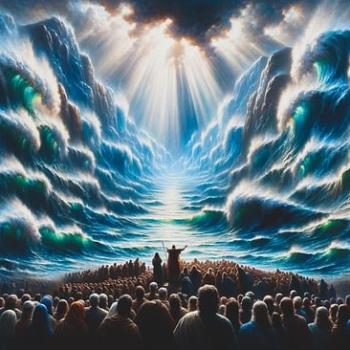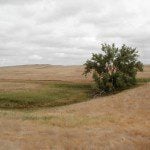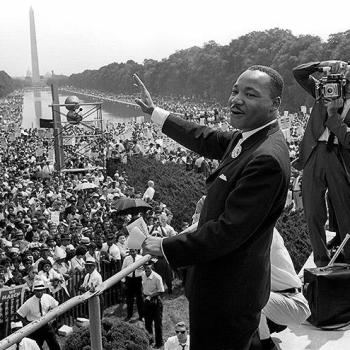The truth is, abortion and gay marriage just didn't come up that much in the sermons or in the conversations of the church. Abortion came up a couple of times as a tragic thing happening in our country. Whenever homosexuality came up, it was used as material for jokes. Gay jokes were one of the main reserves of material for humor at Thomas Road - which made "Love the sinner, hate the sin" seem implausible. That principle doesn't sync up well with mocking people.
But I found at Thomas Road a more broadly representative interest in issues in the world: in poverty, in disaster relief, in school violence (which was a big issue at the time because of the Virginia Tech shootings). I found a kind of patchwork of interests in issues, in the same way that you would find a patchwork of interests in issues in progressive communities. So I don't think that there's this obsession with exclusively two issues in the way it seems to feel to some people. Those two issues come up time and again between conservatives and progressives mainly because they're so polarizing.
You mention in the book that you did not feel like you had the right to ask for forgiveness from the people you had befriended and deceived. And you were surprised at the immediate forgiveness you were given when you informed your friends at Thomas Road that you had been among them under false pretenses. Did you feel a need for forgiveness?
I certainly wanted it. In the time that passed between leaving Thomas Road and returning to reveal what I had done, I was deeply haunted. As I say in the book, I worried that I was a bad person. It was very strange to have this belated awakening to the fact that some of the things I had done and said had been really bad and really problematic. To reckon with that so late in the process was troubling to me. I wondered, "Why hadn't this been troublesome to me right from my first day?"
When I went back to Thomas Road, yes, I wanted Alice and Ray and everyone at the church to feel okay with what I had done. But I really didn't expect it. I think the main thing that I wanted was the relief of telling the truth, and the relief of being available to everyone for whatever questions or criticisms they had. I wanted to be accountable for that.
That was what I felt on the day I was driving down to admit what I had done. I had been so nervous the night before, I couldn't sleep. But driving down, I just felt so joyful. I felt like I was finally going to be free of this secret. If my book had been, to my mind, ultimately a gesture of respect, I was finally going to be able to behave in a way that truly respected the people I came to know at the church by being honest with them.
It felt like I was making something right. So the forgiveness...I wanted it, but the fact that I got it made me feel unworthy of it. It's hard for me to fully accept and feel comfortable with the forgiveness, because it feels like I didn't earn it. It feels like it has more to do with their orientation toward the unexpected, and toward troublesome events, than it does with anything I deserve.
The parallels between what you described just now and the way evangelicals feel about their own forgiveness are striking. Your drive down to Thomas Road sounds like walking down the center aisle to answer an altar call. You have a quotation in the Epilogue from a Christian who says, "We're never more like Christ than when we forgive the unforgiveable." Christians believe that the forgiveness we receive from God reflects more of the character of the forgiver than the worthiness of the one forgiven.
That's right! That's from a Johnny Moore sermon about when he got angry with a woman in a line at a grocery store. [Laughs.] It seemed like a petty anecdote for such a powerful quotation.
What did you find most compellingin the lives of the people you came to know through Thomas Road Baptist Church?
Their individual selflessness. Their willingness to help other members of the ministry. Their willingness to work. Their individual humility. I found all of that really compelling.
It sharply contrasted with my preconception, which was that evangelical Christians were domineering. Yet the in-person experience was that they really embodied this idea that they were put on earth to be servants and their own personal interests should be secondary. That was very moving to me. I felt that I learned a lot from it, that I took a lot of instruction from it.
What, in turn, can evangelicals themselves learn from your experience?
My experience of this particular evangelical community was that there was a real fear of the outside world, fear of people who didn't adhere to the same principles. When we went on the mission trip to Alaska, even though we were interacting with homeless people in a tender way, even though we were reaching out to these children in a way that actually bothered me, I think that there was a baseline us-versus-them attitude.





